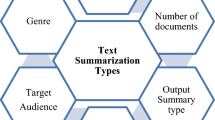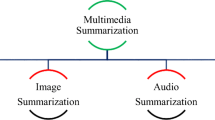Abstract
Text summarization method produces the shorter or abstract version of text after giving the large source text. It provides the meaningful information of the source text, i.e. the text’s meaning is intact and accurate. Text summarization tools have a powerful impact on today’s world due to the increasing information with a massive rate on the Internet. It is very difficult for a person to describe and ingest the whole content. The manual conversion or summarization is very difficult task, hence automation is need. The automation can be achieve using artificial intelligence techniques. Text summarization methods are classified into two categories: Extractive and abstractive. The extractive method, as its name suggests, consists of extracting important sentences or paragraph from some source of text and rejoining them to get the summarized form of the source content. The criteria for evaluating an importance of a sentence or paragraph is based on the statistical features parameter of the sentences, and the abstractive method is all about knowing the source text and re-writing the text in a few words that describes the whole source text. In addition, this method uses a linguistic approach to check and interpret the source text. In this article, extractive text summarization methods are applied to the job. The validation of the model is performed using the bench-marked source text. From the obtained result, it is evident that the summarization model performs well and do the summarization which is very precise and meaningful.
Access this chapter
Tax calculation will be finalised at checkout
Purchases are for personal use only
Similar content being viewed by others
References
Gupta, V., Lehal, G.S.: A survey of text summarization extractive techniques. J. Emerg. Technol. Web Intell. 2(3), 258–268 (2010)
Das, D., Martins, A.F.T.: A survey on automatic text summarization. Liter. Surv. Lang. Stat. II Course at CMU 4(192–195), 57 (2007)
Sabharwal, M.: The use of soft computing technique of decision tree in selection of appropriate statistical test for hypothesis testing. In: Soft Computing: Theories and Applications, pp. 161–169. Springer (2018)
Motwani, K.R., Jitkar, B.D.: A model framework for enhancing document clustering through side information. In: Soft Computing: Theories and Applications, pp. 195–207. Springer (2018)
Mohd, M., Hashmy, R.: Question classification using a knowledge-based semantic kernel. In: Soft Computing: Theories and Applications, pp. 599–606. Springer (2018)
Mahajan, R.: Emotion recognition via EEG using neural network classifier. In: Soft Computing: Theories and Applications, pp. 429–438. Springer (2018)
Villa-Monte, A., Lanzarini, L., Bariviera, A.F., Olivas, J.A.: User-oriented summaries using a PSO based scoring optimization method. Entropy 21(6), 617 (2019)
Qazvinian, V., Radev, D.R.: Scientific paper summarization using citation summary networks. In: Proceedings of the 22nd International Conference on Computational Linguistics, vol. 1, pp. 689–696. Association for Computational Linguistics (2008)
Saggion, H., Lapalme, G.: Concept identification and presentation in the context of technical text summarization. In: NAACL-ANLP 2000 Workshop: Automatic Summarization (2000)
Allahyari, M., Pouriyeh, S., Assefi, M., Safaei, S., Trippe, E.D., Gutierrez, J.B., Kochut, K.: Text summarization techniques: a brief survey. arXiv:1707.02268 (2017)
Wu, P., Zhou, Q., Lei, Z., Qiu, W., Li, X.: Template oriented text summarization via knowledge graph. In: 2018 International Conference on Audio, Language and Image Processing (ICALIP), pp. 79–83. IEEE (2018)
Cepi Slamet, A.R., Atmadja, D.S., Maylawati, R.S., Lestari, W.D., Ali Ramdhani, M.: Automated text summarization for Indonesian article using vector space model. In: IOP Conference Series: Materials Science and Engineering, vol. 288, p. 012037. IOP Publishing (2018)
Ramachandran, L., Cheng, J., Foltz, P.: Identifying patterns for short answer scoring using graph-based lexico-semantic text matching. In: Proceedings of the Tenth Workshop on Innovative Use of NLP for Building Educational Applications, pp. 97–106 (2015)
Khan, R., Qian, Y., Naeem, S.: Extractive based text summarization using k-means and tf-idf (2019)
Langville, A.N., Meyer, C.D., FernÁndez, P.: Google’s pagerank and beyond: the science of search engine rankings. Math. Intell. 30(1), 68–69 (2008)
Author information
Authors and Affiliations
Corresponding author
Editor information
Editors and Affiliations
Rights and permissions
Copyright information
© 2020 Springer Nature Singapore Pte Ltd.
About this paper
Cite this paper
Soni, V., Kumar, L., Singh, A.K., Kumar, M. (2020). Text Summarization: An Extractive Approach. In: Pant, M., Kumar Sharma, T., Arya, R., Sahana, B., Zolfagharinia, H. (eds) Soft Computing: Theories and Applications. Advances in Intelligent Systems and Computing, vol 1154. Springer, Singapore. https://doi.org/10.1007/978-981-15-4032-5_57
Download citation
DOI: https://doi.org/10.1007/978-981-15-4032-5_57
Published:
Publisher Name: Springer, Singapore
Print ISBN: 978-981-15-4031-8
Online ISBN: 978-981-15-4032-5
eBook Packages: Intelligent Technologies and RoboticsIntelligent Technologies and Robotics (R0)




